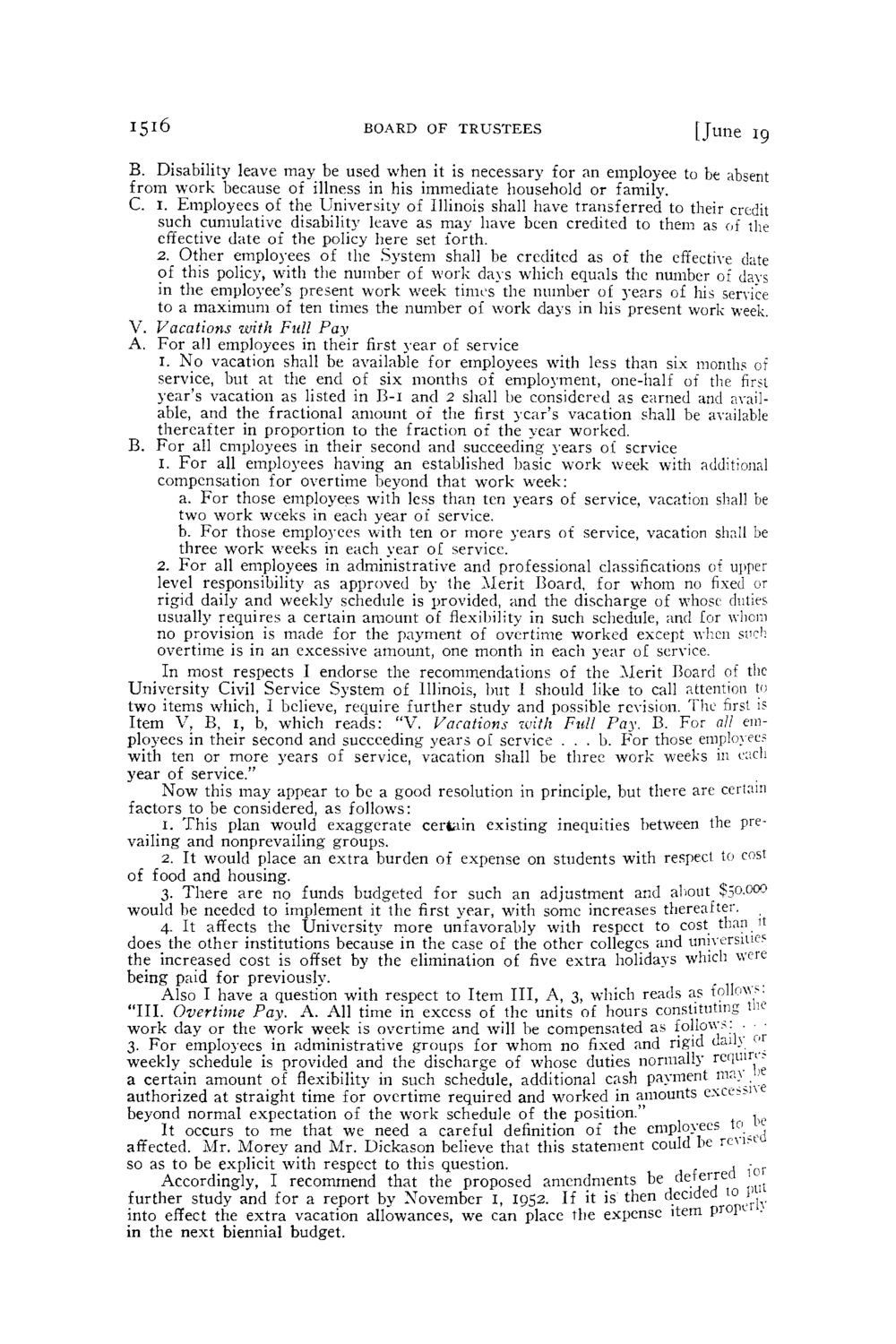| |
| |
Caption: Board of Trustees Minutes - 1952
This is a reduced-resolution page image for fast online browsing.

EXTRACTED TEXT FROM PAGE:
i5z6 BOARD OF TRUSTEES [June B. Disability leave may be used when it is necessary for an employee to be absent from work because of illness in his immediate household or family. C. I. Employees of the University of Illinois shall have transferred to their credit such cumulative disability leave as may have been credited to them as of the effective date of the policy here set forth. 2. Other employees of the System shall be credited as of the effective date of this policy, with the number of work days which equals the number of days in the employee's present work week times the number of years of his service to a maximum of ten times the number of work days in his present work week. V. Vacations with Full Pay A. For all employees in their first year of service I. No vacation shall be available for employees with less than six months of service, but at the end of six months of employment, one-half of the first year's vacation as listed in B-i and 2 shall be considered as earned and available, and the fractional amount of the first year's vacation shall be available thereafter in proportion to the fraction of the year worked. B. F o r all employees in their second and succeeding years of service 1. For all employees having an established basic work week with additional compensation for overtime beyond that work week: a. For those employees with less than ten years of service, vacation shall be two work weeks in each year of service. b. For those employees with ten or more years of service, vacation shall be three work weeks in each year of service. 2. For all employees in administrative and professional classifications of upper level responsibility as approved by the Merit Board, for whom no fixed or rigid daily and weekly schedule is provided, and the discharge of whose duties usually requires a certain amount of flexibility in such schedule, and for whom no provision is made for the payment of overtime worked except when st'ch overtime is in an excessive amount, one month in each year of service. In most respects I endorse the recommendations of the Merit Board of the University Civil Service System of Illinois, but I should like to call attention to two items which, I believe, require further study and possible revision. The first is Item V, B, i, b, which reads: "V. Vacation's with Full Pay. B. For all employees in their second and succeeding years of service . . . b. For those employee? with ten or more years of service, vacation shall be three work weeks in each year of service." Now this may appear to be a good resolution in principle, but there are certain factors to be considered, as follows: i. This plan would exaggerate certain existing inequities between the prevailing and nonprevailing groups. 2. It would place an extra burden of expense on students with respect to cost of food and housing. 3. There are no funds budgeted for such an adjustment and about_ $50,000 would be needed to implement it the first year, with some increases thereatter. 4. It affects the University more unfavorably with respect to cost than it does the other institutions because in the case of the other colleges and universities the increased cost is offset by the elimination of five extra holidays which were being paid for previously. Also I have a question with respect to Item I I I , A, 3, which reads as follow >^ "III. Overtime Pay. A. All time in excess of the units of hours constituting tne work day or the work week is overtime and will be compensated as follows: . 3. For employees in administrative groups for whom no fixed and rigid daily & weekly schedule is provided and the discharge of whose duties normally rcquiri? a certain amount of flexibility in such schedule, additional cash payment ma} authorized at straight time for overtime required and worked in amounts excess beyond normal expectation of the work schedule of the position." . It occurs to me that we need a careful definition of the employees to affected. Mr. Morey and Mr. Dickason believe that this statement could be reu> so as to be explicit with respect to this question. , -r Accordingly, I recommend that the proposed amendments be deferred ^ further study and for a report by November I, 1952. If it is then decided to 1^' into effect the extra vacation allowances, we can place the expense item pr 1 in the next biennial budget.
| |